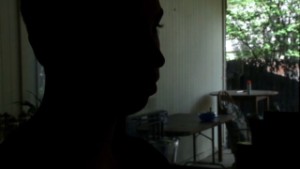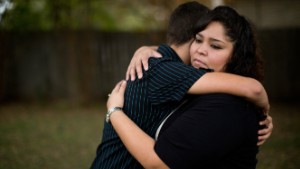- Gianni Cristini says he hears voices from his stuffed animals, other things
- His family has struggled to get answers and a diagnosis
- His parents are worried about their safety as he gets older and stronger
- "We need help," Gianni's mother says
(CNN) -- His mother is direct and matter-of-fact about her son over the phone.
Severe anxiety. Depression. Voices and visions in his head. Suicidal at age 4.
I, too, have a 4-year-old child. I wonder, is that even possible?
Jennifer Cristini is calm and methodical in our first phone conversation. She says it's from years of repeating these same symptoms and stories to doctors, teachers, neighbors and friends.
I imagine their reaction must be similar to mine: dismay, sadness and helplessness.
"But there's no sympathy," says Cristini.
It's hard to imagine how anyone cannot be sympathetic when they first meet 10-year-old Giovanni Cristini, or Gianni, as his family has called him since he was adopted at birth.
He looks younger than 10, with cherubic cheeks and freckles dotting his nose. His adult teeth are too large for his face, which breaks widely into a smile when you talk about his favorite Pokemon, Pikachu. His hair is curly and a little unruly from recess with his friends.
 Liza Long: "My son deserves treatment"
Liza Long: "My son deserves treatment"  My Son Has a Mental Illness
My Son Has a Mental Illness  He hears voices, she wants hers heard
He hears voices, she wants hers heard Do you know what you have? "I have bipolar," Gianni says to me, looking down and rocking. He has a little nervous energy and hard time focusing. But like many children his age, he just wants to please.
Do you hear voices? "Yeah, from my stuffed animals and other things. It scared the crap out of me."
I can feel his mom, who is standing several feet away from us, flinch. She doesn't like coarse language from her children.
Your stuffed animals? What do you mean, you hear things from your stuffed animals? "Yeah. Voices came in my head. So I told my mom. I couldn't even listen to my music."
Are they friendly? Are they nice? "No!"
Gianni says the word loudly, his tone serious and adult. He wants me to understand: "They're just not friendly," he stresses, emphasizing every word.
Mental illness in children: Where to turn
I know he's telling me the truth, but it's still hard to believe -- maybe because he's so young and innocent-looking. It's hard to imagine terrifying demons in a child this small.
'The fire in his brain'
Then Cristini hands me a thumb drive with some home video. She couldn't possibly capture every episode. These are just a few from the last few years.
Gianni is younger in the video, maybe 7 years old. He looks even smaller but the sound coming out of him is the bloodcurdling screams of horror movies. It is sheer terror coming out of a pint-sized human.
"They're not going!" Gianni screams on the video, his arm extended at the ghosts in front of him.
Gianni's father lays his body over his son. The weight and pressure calm him, he explains to me.
You can hear his mother's voice, even and calm on the video as she coaxes Gianni to practice his breathing.
"I'm just trying to get the fire in his brain out," she says.
Cristini is as calm with me as her voice is on the video. She is statuesque, with the sort of remarkable beauty that opens doors and others assume reflects a life of ease. It hides the amount of practice she's had dealing with her child's psychotic rages.
Gianni has been with the Cristinis -- Jennifer and her husband, Vittorio -- since he was born. Jennifer Cristini carried him out of the hospital in her arms, as ecstatic as if she'd carried and birthed him herself. Gianni may be adopted, but there is no question that he is a Cristini, down to the Italian first name his father -- a Rome native -- gave him.
The Cristinis were like any new parents, nervous and a little overprotective of their first child. They rejoiced when he walked at 10 months. He's ahead of the curve, thought his mother proudly. With curly hair, his eyes brown and wide, the little boy was perfect in every way to his parents.
But when her son was as young as 18 months, Jennifer Cristini began looking up childhood behavior regularly on the Web.
I lost my husband to bipolar disorder
Like most new mothers, she wasn't sure if the behavior her son was exhibiting was normal. Most mothers only look here and there out of a brief moment of anxiety. But it was all Cristini researched on the Web.
Her beautiful boy was obsessive about toys and clothing. He demanded the same shirt every morning and threw a tantrum if it wasn't ready. And it wasn't just crying; it was like the end of his world. They didn't ever stop; they just kept getting worse.
When Gianni stopped sleeping because of his rages, his mother was terrified. All the parenting books said sleep was as important as nutrition. Why wouldn't he sleep?
And these weren't night terrors that kept her boy up at night. His parents were terrified of sleeping themselves.
Searching for answers
The Cristinis' pediatrician sent him to a specialist. The waiting list was a year.
"Just for testing, and you don't get a diagnosis," she says. "You ask friends or neighbors and nobody has a clue. They stop talking to you. They're tired of hearing your son screaming all the time. There's nothing you can do except fight and wait and call."
The doctors first thought Gianni might be on the autism spectrum, although he didn't quite fit the profile. Cristini still leapt at the diagnosis, because it allowed her to make an appointment with another specialist.
Then more waiting.
When he was almost 5 years old, a doctor prescribed him an antidepressant. The doctor didn't know what was wrong with Gianni and thought maybe it was an attention problem or a depression issue.
The drug wasn't tested on children, because of the obvious ethical complications. Cristini was nervous.
"You're so desperate you're willing to take anything as a diagnosis," she recalls of that episode. "There's this massive guilt you carry all the time. What more can I do? Maybe I brought him to the wrong doctor?"
She watched Gianni take the pill. It took only an hour for her to realize what a terrible mistake it was.
"After that one dose he says, 'Mom, I'm gonna kill myself.' He's saying, 'I can't take it anymore. I just want to die. I want to go to the woods and kill myself. Can you just leave me on the road somewhere?' At (nearly) 5. You're like -- this isn't ... he doesn't have ADD. There's something else going on here."
The doctor's office suggested another specialist. And then another waiting list.
There was a doctor who warned Cristini her son wouldn't amount to much so she should just get used to it.
Then there was the doctor who prescribed Gianni a drug even though he'd never seen him in person.
Warning signs parents can't ignore
It is little wonder Cristini has a gallon-sized plastic bag of prescription bottles, all with Gianni's name on them. Many of the bottles still have pills in them.
"You try a medicine and it works for one day, or two days, maybe a week, and then it stops working," says Cristini, her frustration visible as she holds up the bottles.
"You feel like no one knows how to help you or really what to do or really what they're doing. It's this incredible puzzle that you're trying to figure what piece goes where and what combination will work. And that puzzle is always changing as he grows."
The Cristinis blame an entire culture and medical field that lacks research or compassion toward children with mental illness.
The National Alliance on Mental Illness estimates "4 million children and adolescents in this country suffer from a serious mental disorder that causes significant functional impairments at home, at school and with peers."
Despite the numbers, public schools struggle to cope with mentally ill children. Gianni attends Pathways Academy, a rare private institution in Albuquerque that accepts mentally ill children. At this small school, being bipolar or schizophrenic doesn't make you too dangerous to educate.
Pathways was started 11 years ago by a parent frustrated by the lack of resources in public schools for her two special-needs children.
"People blame parents for their child's behavior. 'If you take a switch to them, they'll be better and do better things,'" explains principal Jan Secunda. "That kind of mentality still exists that it's the parent's fault or the child has a character flaw, not that it's a neurobiological disorder or illness."
What's worse, says Secunda, is that there's even less sympathy for patients the younger they are. "I think there's a lot more acceptance of adult mental illness than there is of childhood mental illness. They think it's a bad kid, not an ill kid."
The school is a lifesaver for the Cristinis, who want desperately for Gianni to socialize with other children.
'I come in my room and hide'
Vittorio Cristini, a scientist in cancer research, says a school infrastructure for mentally ill children is more important to him than any cure. "Gianni needs a place where he can thrive," he says.
Like most scientists, he is a rational man. He understands the biology of his son's illness. You're almost distracted by the rolling Italian accent covering every word, until the seriousness of his words land.
Mental illness in children: Know the signs
But with every day that passes, Gianni grows stronger while his parents grow older.
He has frightened his father and mother. "He's threatened to kill us. He says 'I want you dead, I want to kill you. I want you out of my life.' And he comes after us," says Jennifer Cristini. She's heard it so often that she can't say how many times her son has screamed those threats at her.
The parents worry about protecting their other two children, 5-year-old Tizita and 7-year-old Gabriella. They both know their brother has been diagnosed with bipolar schizophrenic affective disorder. At least, that's the current diagnosis.
Tizita grabbed me by the hand and took me to her room, filled with the telltale dollhouse and pink blankets of a little girl.
Her brother's room is next door and she loves to run into his room. But when Gianni is in the middle of a psychotic rage, "sometimes I come in my room and hide," she says.
Then she shares her worst fear about her family. "I feel like Gianni's gonna kill my mom and dad."
"I lift weights to stay strong," Vittorio Cristini says. But "what will happen when we are old?"
"He isn't getting better," says Jennifer Cristini. "We see his mental illness getting worse every year. You hope for everything but you have to be realistic.
"When he's 18 and taller than me, weighs more than me? I worry about that. I worry about the fact that he comes at me now, at age 10. What's he going to be like in eight years? Will there be a medicine that works for him anymore?"
She says she wants CNN to come into her home and share her family's personal story so other parents don't feel alone. She wants pediatricians, schools and her community to change.
But most of all, she wants this: "We need help."